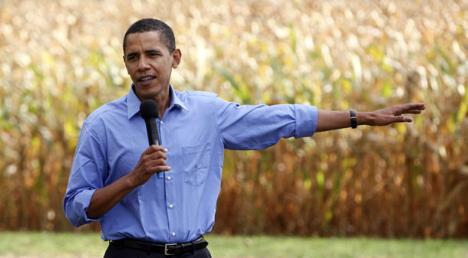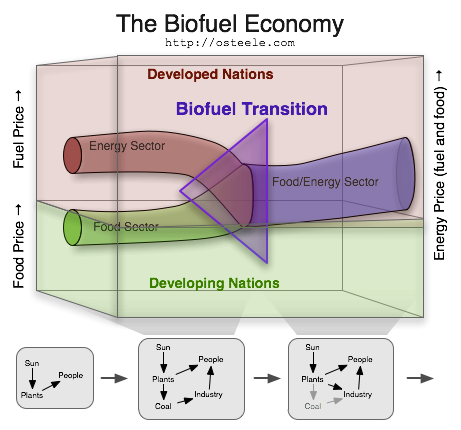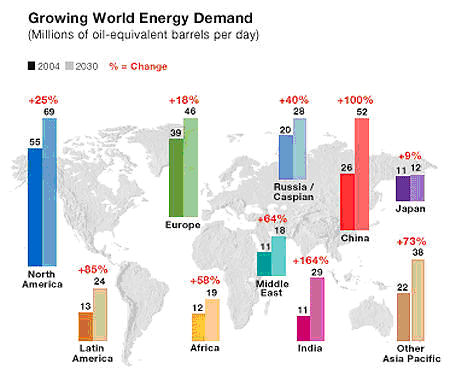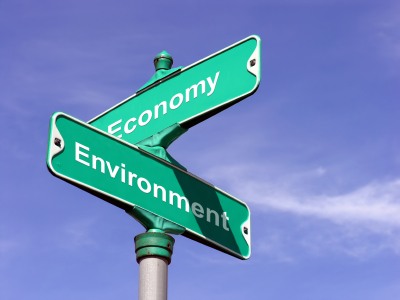 In the near future people would line up to fill their cars with ethanol or other bio fuels instead of today's method of filling your car with gas or diesel. [Image Above]  Obama giving a speech on the importance of bio fuels and the Energy Policy Act. [Image Above] | Political Impacts The political impact for bio fuels and bio energies has it's pros and cons. Whether it be President Obama's policies on bio fuels or the Energy Policy Act of 2005, many bio fuel industries have been impacted. Obama has been a high supporter of creating alternative fuel in order to save money on oil. His compromise of utilizing corn for energy was first proposed when he was running for election. This thought led him to belief that this aspect of growth could save the economy, and overseas investments for oil. Biofuels, an economic aid was soon to be a problem. President Obama's, green advisory had exclaimed an issue of his progressive thoughts. Daniel Kammen's, one of Obama's green advisory employers reported that a car will emit more greenhouse gases driving on corn ethanol processed with coal than it will using normal petrol.Another issue arises from Berkley professor, a car will emit more greenhouse gases driving on corn ethanol of processed with coal than it will using normal petrol. A conclusion was led that using smarter biofuel polices would aid the economy, but it would be difficult to achieve. "To address this clash of policies, views, economic valuations and environmental goals, a clear set of evaluation methodologies, and high-quality, open access to data will be required," says Kammen. President Obama's ideals led them to conclude numerous accounts for future resource. Still today he progresses to aid the economy in terms of oil investing and processing. Federal ethanol-fuel policies forced consumers to invest an additional .5%-.8% in the inflammation of food prices in 2008, and the
government itself could possibly end up paying nearly $1 billion more this year. This is due to the fact that food stamp were initially substituted because of ethanol use, according to a new government
report.The ethanol mandate helps confirm the raise in food prices. “Producing ethanol for use in motor fuels increases the demand for corn,
which ultimately raises the prices that consumers pay for a wide
variety of foods at the grocery store, ranging from corn-syrup
sweeteners found in soft drinks to meat, dairy and poultry products,”
the CBO said.Although it has developed higher technological advance towards the economy, the food shortages become a problem. It may impact the economy as it may cause a disturbance in food prices. |
Social Impacts The use of biofuels has had many social implications and impacts around the world. One of the more major impacts biofuels causes is conflicts over land. Plantation developments have caused numerous land conflicts around the world. In Indonesia, since indigenous people and other rural communities rarely have formal land rights, palm oil companies have taken over large tracts of customary right lands and community forest, which traditionally provide a livelihood to 40 million people. Such developments often lead to numerous, persistent and often violent conflicts between local communities and companies. (Via birdlife.org) Another big factor in the production of biofuels is the fact that some of the imported biofuels might have been harvested by means of forced labor or near slavery working conditions. These sorts of things usually happen in developing 3rd world countries where the humanitarian rights of the people are not recognized by the government or employers in country. For example in the country of Brazil, sugarcane plantation workers earn barely over $1 for every one ton of sugarcane they cut. The workers here usually work in 12+ hour shifts without breaks in temperature that regularly exceed 90º F. Some of the workers even die while working because of heat exhaustion and fatigue. Some workers such as female workers in impoverished areas of Indonesia work without pay on oil palm plantations. These are the things we would have to watch out for when importing biofuels from foreign countries (especially 3rd world countries since these are the most prolific places known for using forced labor). On a positive note, the widespread use of biofuels and similar ‘green’ technologies would help reduce carbon emissions. This is because if more people used vehicles that ran off of biofuels, then less carbon would be released into the atmosphere. This would in turn result in cleaner air and a reduction in air pollution in the surrounding environment. And less air pollution would lead to a decrease in acid rain, which would provide for a healthier natural environment. This would prove to be very beneficial for humans and the natural environment.
 "Food vs Fuel" debate. [Image Above] |
Click play to see Kenya's hope to reduce poverty by means of producing bio fuels.  |
Economic Impacts
A major impact of the development and production of biofuels and other biotechnologies would be that it would increase the number of jobs available in today’s market. According to World Bank, biofuel industries employ about 100 times more workers per unit of energy produces than the fossil fuel and oil industry does. This can be seen in the ethanol industry which has been proven to have created more than 200,000 jobs in the U.S. and around 500,000 jobs in Brazil. The jobs that the biofuel industry creates would in turn boost our overall economy. This is because with more people working in the field of biofuels we would be able to create and export more biofuel related products and technologies to other countries which would then increase our economy even more which would then let us expand our biofuel/biotechnology market thus creating even more jobs, resulting in a larger economic boost.
Biofuels could also help us limit our demand and dependence for foreign oil. According to recent statistics published in 2008, 485 million barrels of ethanol were produced between 2007 and 2008, which is equivalent to 320 million barrels of gasoline. If those 485 million barrels were not available for use, the world’s oil refiners would have had to produce an additional 1.9 million barrels of crude oil per day. “Given that oil supply does not expand easily, meeting such an increase in demand would likely result in a short-term price increase of 27.5%.”(University of Tennessee)
Despite all these positive facts, there is one major drawback. That drawback is that the production of biofuels could lead to a rise in food prices. This is due to the fact that if the use of biofuels were to become widespread, then the majority of corn type products would go towards the production of biofuels, instead of food. This is turn would make a food such as corn, and sugarcane more expensive.
 Projected demand of energy by the world up to the year 2030. Notice how Americas energy demand greatly surpasses that of any other region on the Earth. Its even ahead of developing countries such as China and India. [Image Above] |  Helping the environment, could in turn help the economy. [Image Above] |